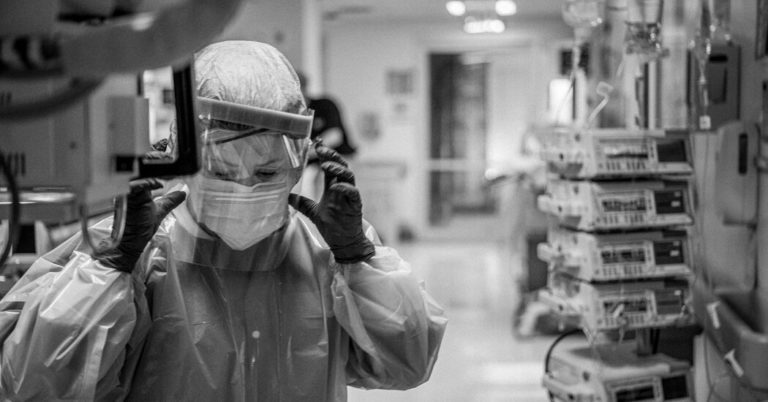

LIFE ON THE LINE
Young Doctors Come of Age in a Pandemic
By Emma Goldberg
In her new book, “Life on the Line,” the journalist Emma Goldberg focuses on six young doctors during the Covid-19 surge in New York City last spring. There’s Sam, a gay man all too aware of American medicine’s homophobic past; Gabriela, a Hispanic woman raised by a mother who never went to college; Iris, a first-generation Chinese-American woman whose family is skeptical of white doctors; Ben, an amateur bartender fascinated by end-of-life care; Elana, who grew up on Long Island in an observant Jewish family; and Jay, whose father wanted her to marry and start a family instead of going to medical school. (“That’s not women’s work,” he explained to her.)
These newly minted doctors represent the vanguard of American medicine. Socially conscious and with a streak of activism, they are committed to serving patients who have been marginalized in what Goldberg calls the “whitewashed, wealth-washed” American medical system. In this spirit, they volunteer, as fourth-year medical students, to graduate early and begin internships at New York City hospitals besieged by the pandemic. They do not think of themselves as heroes, but in their commitment to their profession, even in the face of personal risk, one would be hard-pressed to see them any other way.
When they arrive on the wards, these young doctors discover that hospital care in a pandemic poses a grim set of challenges. Patients are dying at alarming rates. A code, signifying cardiac arrest, is being called every few minutes. Moreover, new rules to prevent infections among health care workers limit the time they can spend at the bedsides of the sick and dying. How do you care for patients when you cannot examine or even speak with them? It was a dilemma faced by many doctors on the front lines.
In one of the cruelest aspects of the pandemic, new doctors learn that patient isolation extends even to the dying process. “Before the pandemic, a patient’s death in the hospital might include up to 35 family members packed into a room with musical instruments and prayers,” Goldberg writes. “During Covid, it was more likely to involve a nurse holding up an iPhone.”
One of the most poignant stories in the book involves Manny, a 38-year-old with Down syndrome, whose father dies of Covid in the hospital, leaving him an orphan. The father had planned to outlive his disabled son. Now, doctors and social workers must figure out what to do with the bereaved young man.
This is the kind of story that gives life to books about medical training. Unfortunately, there are too few of them here. The back story of the various characters takes too long. Drawn-out digressions on medical racism or the history of the internship system further disrupt the narrative flow. By the time we get to the wards, the book is nearly a third over. Goldberg would have done better, I think, to start the book when the internships begin and fill in the back story later. How Gabriella’s mother started her hair salon isn’t as interesting to us as the sounds, smells and action on the front lines.
When the action does begin, the stories are often truncated. We thirst for more details. We want to know more about what these young doctors were thinking in life-or-death situations. We yearn for a glimpse into their souls as they come of age in their new profession. On this measure, the book falls a bit short.
Still, I believe the book is a valuable chronicle of what interns and residents went through fighting the pandemic this past year. They served courageously, even as the actions of the public and public officials made their jobs harder.
In this vein, Goldberg reminds us of this clueless boast from Gov. Andrew Cuomo in March 2020, just as Covid was beginning to surge in New York City: “We think we have the best health care system on the planet right here in New York,” he said, before adding of the pandemic, “We don’t even think it’s going to be as bad as it was in other countries.” As Goldberg’s young doctors can attest from their experience last year, in some ways it was worse.